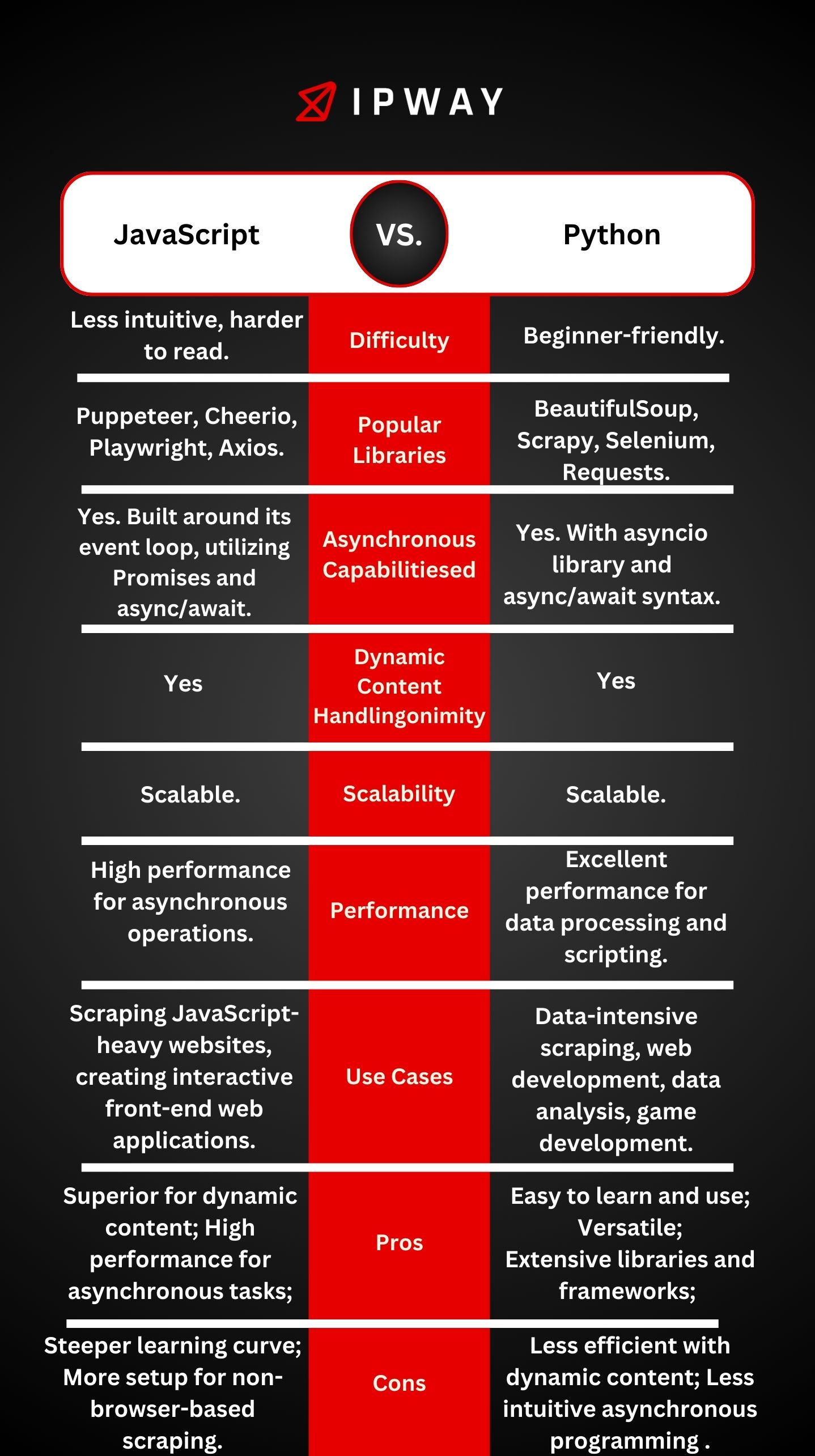In 2024, web scraping has become a tool for companies, marketing professionals and data experts seeking to efficiently collect vast amounts of data from websites. Whether its extracting pricing details from stores gaining insights from social media platforms or monitoring digital trends web scraping enables users to automate the data collection process turning what was once a laborious task, into an automated solution.
When deciding which programming language to use for web scraping tasks, JavaScript vs Python are usually the options to consider. Python is recognized for its user friendliness and efficiency well as its extensive library collection that makes web scraping a breeze. On the side JavaScript excels in handling dynamic content produced by modern web technologies.
This article delves into the discussion between JavaScript vs Python for web scraping purposes by providing a detailed analysis of their characteristics including performance metrics and asynchronous functionalities among others aspects to consider for comparisons sake.
Furthermore we will investigate the benefits of incorporating a proxy to improve the efficiency and security of web scraping activities regardless of the programming language used. Upon concluding this article you will be equipped with an understanding to discern which language is more suitable, for your web scraping ventures in the year 2024.
Which is Better for Web Scraping: JavaScript vs Python?
The response to this query greatly relies on the nature of the web scraping tasks you aim to accomplish. Although both programming languages have advantages your decision will ultimately be influenced by the particular needs of your project.
Difficulty
Python is well known for its user nature because of its straightforward and clear syntax. A lot of people who want to learn coding begin with Python since it is the language for newcomers to web scraping. The Python community offers tutorials and open source projects that make learning easier. Tools such as BeautifulSoup and Scrapy make the scraping process even simpler by requiring setup, for fast tasks involving scraping data.
JavaScript tends to be more challenging for newcomers compared to Python because it was initially meant for front end web development and requires understanding of both browser settings and current web coding methods in order to start out with it effectively. On the other hand, Node.js has expanded the capabilities of JavaScript to cover full stack development tasks making it a strong contender against Python when it comes to backend operations such as web scraping.
For individuals who are already knowledgeable, in front end development or are experienced in using JavaScript frameworks transitioning into web scraping with JavaScript can be a relatively straightforward process.
Popular Libraries
Pythons established ecosystem shines in the realm of web scraping tasks because of tools like BeautifulSoup that streamline the extraction of data from HTML and XML documents with ease and efficiency—a popular choice among developers for parsing tasks on static websites where content is readily accessible in the source code without the need, for executing JavaScript code snippets.
Scrapy is a Python library that offers enhanced features such as handling requests and scaling across various websites simultaneously. Its built in crawling engine is perfect for extracting data, from sites or multiple domains at once. Additionally Scrapy manages retries, cookies and rate limiting by default resulting in configuration requirements.
When it comes to JavaScript programming tools Puppeteer stands out as a favored choice for web scraping tasks among developers due to its versatility and ease of use. Puppeteer simplifies the process of automating browsers which in turn allows developers to navigate through and interact with dynamic web pages that are typically built using JavaScript.
This feature makes Puppeteer particularly well suited for extracting data from interactive websites like single page applications (SPAs). On the hand Cheerio is another useful JavaScript library that provides an API similar to jQuery for scraping content server side making it a swift and effective solution especially, for extracting static content. Yet when it comes to dynamic websites Puppeteer frequently emerges as the better choice.
When comparing the performance of Python and JavaScript in scraping tasks both languages provide libraries to support this functionality. Nevertheless Pythons extensive ecosystem and user friendly nature tend to make it a preferred option for handling scraping projects. Conversely JavaScript shines in scraping dynamic web pages due to its seamless integration, with browser environments.
Asynchronous Capabilities
Effective web scraping relies, on the use of programming to handle multiple requests simultaneously and reduce scraping time significantly.
Python offers the capability for asynchronous web scraping through tools like Scrapy and Asyncio. Scrapy is structured to manage simultaneous requests smoothly and without hindrance ideal for extracting data from multiple web pages concurrently. Asyncio serves as Pythons library for handling asynchronous operations supporting asynchronous web scraping processes in conjunction with libraries such, as aiohttp which can process HTTP requests asynchronously.
JavaScript incorporates features in its design while Node.js employs an event driven and non blocking I/O model to manage multiple requests concurrently on the server side efficiently.The introduction of async / syntax, in JavaScript enhances the readability and efficiency of asynchronous code.The Puppeteer tool enables the handling of multiple browser instances to expedite the scraping process further.
In this aspect of performance comparison between the two languages. JavaScript and Python. It is noted that JavaScript inherently operates asynchronously whereas Python typically requires the addition of third party libraries such as Scrapy or Asyncio, for capabilities to be integrated. This implies that while Python can indeed facilitate scraping tasks when needed; JavaScript may have a slight advantage in managing extensive dynamic scraping projects effectively.

Dynamic Content Handling
Numerous contemporary websites depend on JavaScript for displaying content; hence the information you aim to extract might not be directly accessible in the initial HTML source code.This creates a hurdle, for web scrapers since they need to execute JavaScript to completely display the content before extracting it.
JavaScript has an edge as the language of the internet because tools like Puppeteer allow JavaScript scrapers to mimic human users on websites by clicking buttons waiting for elements to load and capturing screenshots for confirmation. The comparison between JavaScript and Python speed becomes intriguing, in the context of web scraping with JavaScript outshining Python on websites that heavily depend on client side rendering.
Although Python cannot directly communicate with JavaScript in web browsers it provides tools such as Selenium and Playwright that enable browser automation for extracting content.Selenium can control browsers like Chrome or Firefox to execute JavaScript and retrieve information.However the additional workload in initiating and managing a browser session with Selenium may cause Python based scraping to be slightly slower compared to Puppeteer, in JavaScript.
Scalability
Python is the go to choice for expanding web scraping endeavors due to its scalability features.Scrapy was specifically created with scalability as a priority; it includes capabilities such, as distributed scraping and the ability to manage requests simultaneously while also integrating seamlessly with cloud services.By structuring Scrapy in this way you can expand your web scraping activities horizontally enabling you to scrape a number of web pages with ease.
JavaScript is catching up in terms of scalability. Is not as advanced as Python in this aspect yet. Although Puppeteer and Node.js enable scraping of multiple pages, in JavaScripts ecosystem; when it comes to scaling scraping tasks across various servers or distributed environments it may involve more manual setup and configuration compared to Pythons Scrapy. For instance; setting up load balancing and managing processes would be a task left to the developer when using JavaScript for such tasks.
When used alongside infrastructure setup and configuration adjustments JavaScript has the capability to handle large scales effectively especially for extracting data from interactive websites rich, in JavaScript that demand accurate browser engagement.
Performance
When it comes to performance capabilities, JavaScript vs Python exhibit their advantages and drawbacks. The performance comparison between Python and JavaScript can show differences based on the specific task, at hand.
When it comes to scraping websites Python tends to be quicker in general terms compared to other options out there due to its various libraries such as Requests for handling HTTP requests and BeautifulSoup for parsing HTML documents which allow Python users to efficiently gather data from web pages swiftly and effectively Additionally the wide array of libraries available for Python aids, in simplifying processes and cutting down on the time spent on development tasks.
Use Cases
When choosing between JavaScript vs Python for web scraping, it’s important to consider the specific use case:
- Python: Ideal for extracting information, from websites and conducting extensive data retrieval tasks or when extraction forms a component of a broader data analysis process.
- JavaScript: Perfect for extracting content from websites or applications that consist of a single page or demand seamless compatibility, with web browsers.
Web Scraping: JavaScript vs Python
Lets dive into some real world examples of extracting a websites title and heading using JavaScript vs Python techniques.
Scraping Page Meta Title and H1 with Python
In Python, using BeautifulSoup, scraping meta titles and H1 tags is straightforward:
from bs4 import BeautifulSoup
import requests
url = "https://example.com"
response = requests.get(url)
soup = BeautifulSoup(response.content, "html.parser")
title = soup.find("title").text
h1 = soup.find("h1").text
print(f"Title: {title}")
print(f"H1: {h1}")
Pythons BeautifulSoup library offers a user way to extract information from HTML files while using the requests library to retrieve page data and BeautifulSoup for parsing purposes—a method that proves effective, for handling static content.
Scraping Page Meta Title and H1 with JavaScript
For JavaScript, we can use Puppeteer:
const puppeteer = require('puppeteer');
(async () => {
const browser = await puppeteer.launch();
const page = await browser.newPage();
await page.goto('https://example.com');
const title = await page.title();
const h1 = await page.$eval('h1', h1 => h1.innerText);
console.log(`Title: ${title}`);
console.log(`H1: ${h1}`);
await browser.close();
})();
Here’s how Puppeteer starts by opening a browser without an interface and moves to the webpage to run JavaScript and gather information from it. A great tool for collecting data from websites that load content, in real time.
Conclusion
When comparing JavaScript vs Python for web scraping in 2024 debate scenario each language has its strengths depending on the type of scraping task at hand. Python stands out as the preferred choice for dealing with web pages or large scale scraping projects due to its user friendly nature, wide array of libraries available and scalability features. On the hand JavaScript, especially when used with Puppeteer, excels in scenarios involving dynamic websites and when direct interaction with a browser is essential because of its seamless integration, with modern web technologies.
When choosing between JavaScript vs Python for your web scraping projects needs will vary based on requirements of the project itself; it is essential to consider performance discrepancies of both languages and select appropriate tools to develop effective and adaptable web scrapers that align with your goals.
Are you looking to scale your web scraping projects? IPWAY offers top-tier proxy solutions that can help you scrape Bing and other search engines with ease.
